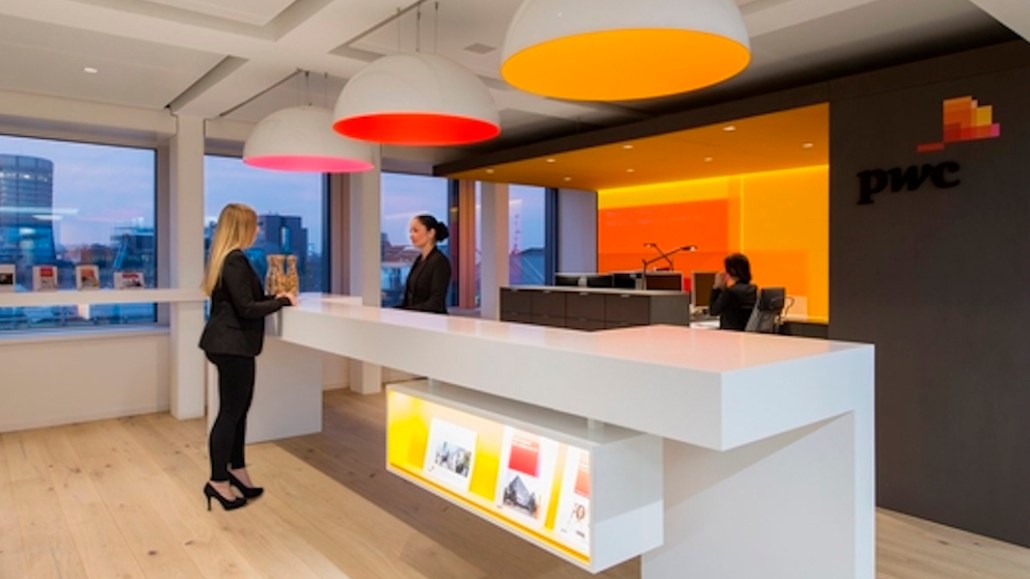Secure your place at the Digiday Media Buying Summit in Nashville, March 2-4
PwC wants in on the agency business, but not media buying

With more than $1 billion in revenue and over 14,000 employees across 32 offices globally, PricewaterhouseCoopers’ digital arm, Digital Services, is encroaching on agency turf through mergers and acquisitions. Now, the practice is helping clients (it declined to share its client roster) set up trading desks on their own, as more and more brands are planning to bring programmatic in house for more transparency.
But one thing PwC Digital Services doesn’t have an interest in building is its own agency trading desk to run programmatic campaigns for clients.
“Media buying is not the most complex marketing problem that our clients want to solve,” said John Swadener, chief operations officer for PwC Digital Services. “We are working with clients on in-house media, but we don’t want to — and will not — get into media buying.”
For instance, if a software company wants to move programmatic in house, Swadener’s team will help the brand figure out how many people it needs to hire in order to manage the new processing, how to structure the teams, the proper technology platforms and how to implement the technology. The only thing that PwC Digital Services doesn’t do is buy media on behalf of the software client. It’s like buying furniture from IKEA: All the materials come in the box, but there is assembly required.
Swadener thinks that programmatic is like search back in 2000 when there were lots of small independent search agencies, but search gradually became an in-house marketing functionality for most brands.
“If clients pass media buying to us, they will always try to keep the cost down in the future by switching to a different agency,” said Swadener. “So why not just help them build their own trading desk in the first place?”
PwC Digital Services doesn’t plan to acquire media agencies or ad tech firms in the near future. The company, along with other Big Four accounting firms and consultancies, is very focused on digital design and user experience, as evidenced in their mergers and acquisitions.
For example, PwC acquired agency Fluid in February of last year and Deloitte bought Heat around the same time. Accenture snapped up a few shops recently, including Germany digital agency SinnerSchrader last month and U.K. agency Karmarama in November 2016.
All of the above are creative shops that specialize in digital design and web development.
John Kaiser, partner of investment bank DeSilva + Phillips that sold Banyan Branch to Deloitte in 2013, thinks that agencies that understand design, user experience and customer engagement are more valuable to big consulting firms because as the consultancies work with companies in transforming their businesses to be more digital, a key consideration is how companies can improve the experiences customers have with their brands and how companies can attract and retain customers in a digital world.
“Today, at least, media planning and buying is less focused on enhancing the customer experience and more oriented toward automation and efficiency, which is why the consultancies are inclined to not have media in-house,” said Kaiser.
Also, media agencies compete on scale, so it is hard for a new player to enter the market, added Brian Wieser, senior analyst for research firm Pivotal.
Media agency execs aren’t exactly sweating, either. Charles Fiordalis, chief digital officer for agency MediaStorm noted that he has never seen a single consultancy get its hands dirty and actually implement its reports on clients’ digital media systems and strategy.
“Even when consulting firms make recommendations, our clients come to us to help interpret them and to take action,” he said. “If anything, they are a helpful force because they have brilliant people who provide frameworks and assessments we can use to help guide change.”
But things are different on the creative side. In the case of PwC Digital Services, it consults CMOs on brand strategy, market insights and marketing performance, and it executes its suggestions for brands.
For instance, if a client doesn’t generate enough return on investment and Swadener’s team identifies that the reason is the brand’s loyalty program doesn’t drive incremental sales, PwC Digital Services will redesign the client’s loyalty program.
“Of course, the brand can bring our structure analysis to other agencies for execution,” said Swadener. “But if that’s the case, the client will need to start over and bring the new agency partner up to speed.”
More in Marketing

Thrive Market’s Amina Pasha believes brands that focus on trust will win in an AI-first world
Amina Pasha, CMO at Thrive Market, believes building trust can help brands differentiate themselves.

Despite flight to fame, celeb talent isn’t as sure a bet as CMOs think
Brands are leaning more heavily on celebrity talent in advertising. Marketers see guaranteed wins in working with big names, but there are hidden risks.

With AI backlash building, marketers reconsider their approach
With AI hype giving way to skepticism, advertisers are reassessing how the technology fits into their workflows and brand positioning.







